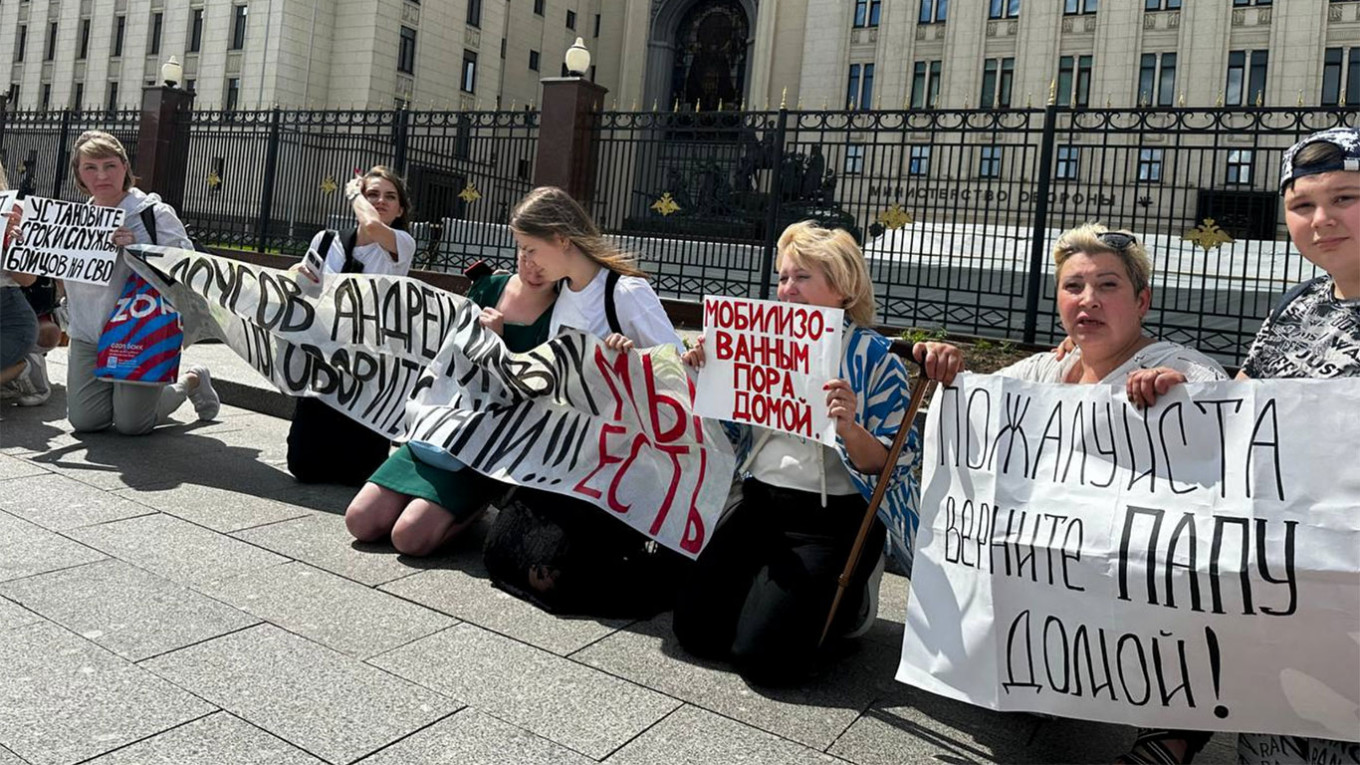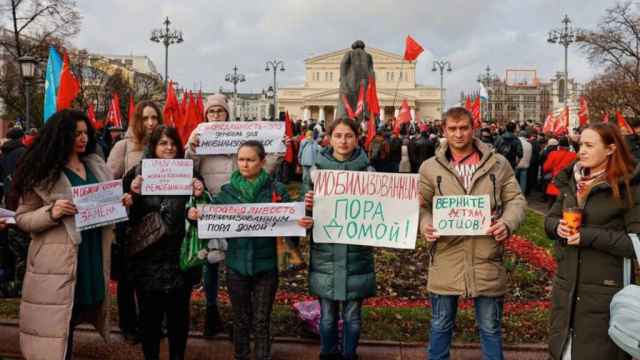Put Domoi (“Way Home”), one of the most prominent groups of women relatives of mobilized Russian soldiers, has been calling on the Kremlin to return their husbands and sons from the front lines in Ukraine for months.
But when Russia designated Put Domoi a “foreign agent” in late May, the move was still fairly unexpected.
“It seems like loving your spouse and wanting him to be safe is a [marker of] ‘foreign influence’ now. I guess at this point, the only thing the government wants from us is to breed to produce more children,” said Maria Andreeva, one of the few public faces of the movement, who herself was also labeled a “foreign agent” on May 31.
Andreeva said she was surprised to see herself named a “foreign agent,” as she had taken a step back from her activities with the group in recent months.
“My colleagues — including the admins of the movement’s channel — are working from the shadows. … And while Put Domoi is not registered as a legal entity, the Justice Ministry decided that I should take responsibility,” Andreeva told The Moscow Times, adding that she plans to challenge her designation in court.
“The funniest thing is that I don’t even have a valid foreign passport. And if they checked my bank accounts, they would know there is not a single penny from abroad,” she said.
The labeling came as political differences and increased law enforcement pressure have fractured the group, putting its future potential to enact change into doubt.
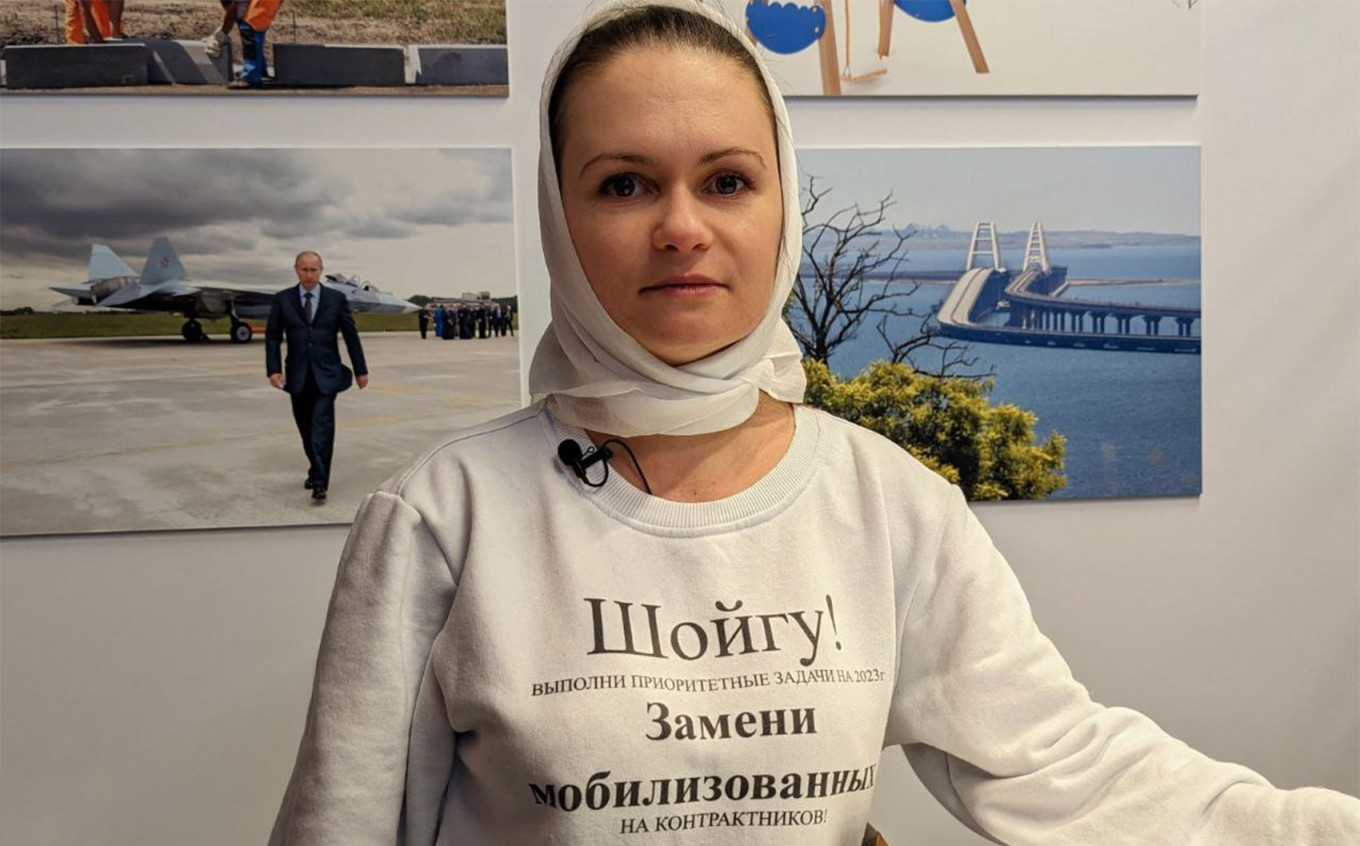
Since its founding last summer, Put Domoi has been one of several groups of mobilized soldiers’ relatives making a simple request to the authorities: to let their sons, brothers and husbands who have been on the front lines since being mobilized in the fall of 2022 come home.
Wearing white scarves, its members have laid carnations at the Tomb of the Unknown Soldier next to the Kremlin and other war memorials across the country every week to draw attention to their cause. The movement has steadily grown, with nearly 60,000 followers on Telegram today.
But as it has faced escalating pressure from law enforcement, Put Domoi has turned to other, less risky tactics — and become increasingly critical of the authorities and the war itself.
This spring, the group started calling on fellow relatives of mobilized soldiers to open their windows at 5 p.m. every Saturday and bang on their cookware in what it called The March of Empty Pots.
“Many [Russians] still live their peaceful lives, like I did before,” Varya, the founder of Put Domoi, told The Moscow Times. “Also, there are probably a lot of other relatives of mobilized men who just don’t know how to join us or ask for help. This action is centered around noise, which might wake someone up — not just locally, but across the whole country.”
Varya asked to speak under a pseudonym, fearing that her husband’s life could be in danger if her real identity were made public.
Inspired by the Cold War-era protests in Chile of the same name, the demonstration is designed to be a safer alternative to laying flowers at World War II memorials, which Put Domoi continues to organize.
“The flower-laying is not safe anymore, especially for journalists who helped cover our activities. That’s why now we have a parallel regular action for those who want to seek the like-minded safely,” Varya said.
In the fall of 2023, Put Domoi and several other smaller groups were invited to a State Duma task force on helping mobilized soldiers’ relatives.
At the time, some of Put Domoi’s members called on officials to swap out their mobilized relatives with fresh troops — calls that tarnished its reputation in the Russian opposition.
“[Officials] told us there was no way to get the mobilized men back without replacing them with someone else,” Varya said.
It soon became clear that this troop rotation wasn’t going to happen.
“We got tired of empty promises,” Varya said. “That’s why we left the State Duma task force ... and demanded full demobilization — that’s mentioned in our manifesto.”
From that point onward, independent Russian media started covering Put Domoi’s demonstrations.
The group’s rhetoric on its official Telegram channel also started to change, increasingly resembling that of the opposition. By December, some of its posts were openly critical of the war.
On Friday, Put Domoi called on the authorities to replace their relatives on the front line with the sons of Russian officials and media personalities like Kremlin spokesman Dmitry Peskov and state television host Vladimir Solovyov.
“We demand to replace our men with other quite specific men: the children and husbands of those who tell our citizens from the screens that war is good,” Put Domoi wrote. “We can make a list long enough to replace every mobilized person.”
When asked about this political shift, Varya said one of the Put Domoi channel’s main purposes is to give members a place to express their opinions anonymously.
“We are just relaying whatever women are thinking, writing and speaking about — we just publish it on our channel,” she said. “Yet our positions might not be shared outside of our movement or among other relatives of the mobilized.”
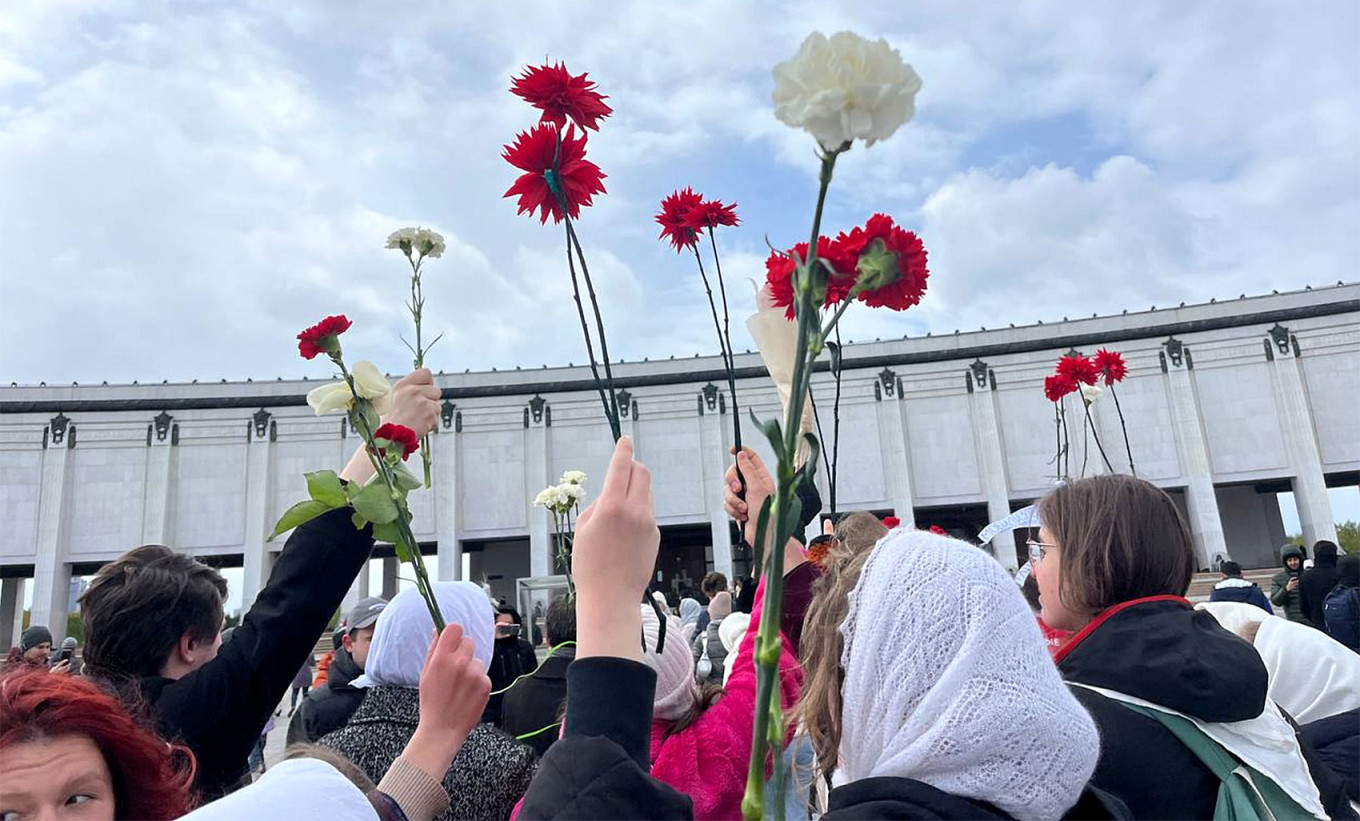
The group’s increasingly anti-war stance has sparked a division between members who oppose the war and those who simply want their relatives back.
Paulina, a former member of Put Domoi who now hosts the Mobilizatsia i Lyudi (“Mobilization and People”) podcast, told The Moscow Times that she left the movement because does not actively oppose the war.
“I believe that any anti-war movement in Russia is doomed to fail,” said Paulina, who does not disclose her surname publicly. “But if there is a chance to at least demand the cancellation of the presidential decree [on mobilization], I’ll take it. If the state wants to keep the special military operation going, it will have to make do with contractors, those who choose to fight on their own accord.”
This shift in rhetoric also amplified the pressure on its members — and on their sons and husbands still in an active combat zone.
Russian commanders “have ‘polite’ conversations with some [of our husbands], so the men start worrying and, of course, argue with their women. Some were told by their commanders: ‘Either your wife shuts up, or we will send you on a suicide mission’,” she said. “So far, no one has been brave enough to look into the seriousness of these threats.”
Law enforcement started showing up at the movement’s public gatherings, initially targeting journalists and later going after Put Domoi members themselves.
Officers attempted to detain Andreeva as she staged a solitary picket outside the Kremlin in January.
Then, in early February, police raided a Put Domoi event, detaining several journalists as well as two activists. Another five were detained at a Feb. 10 flower-laying gathering in Yekaterinburg, one of whom — Ivan Bukin — had his own father mobilized. Put Domoi launched a crowdfunding campaign to cover his fine.
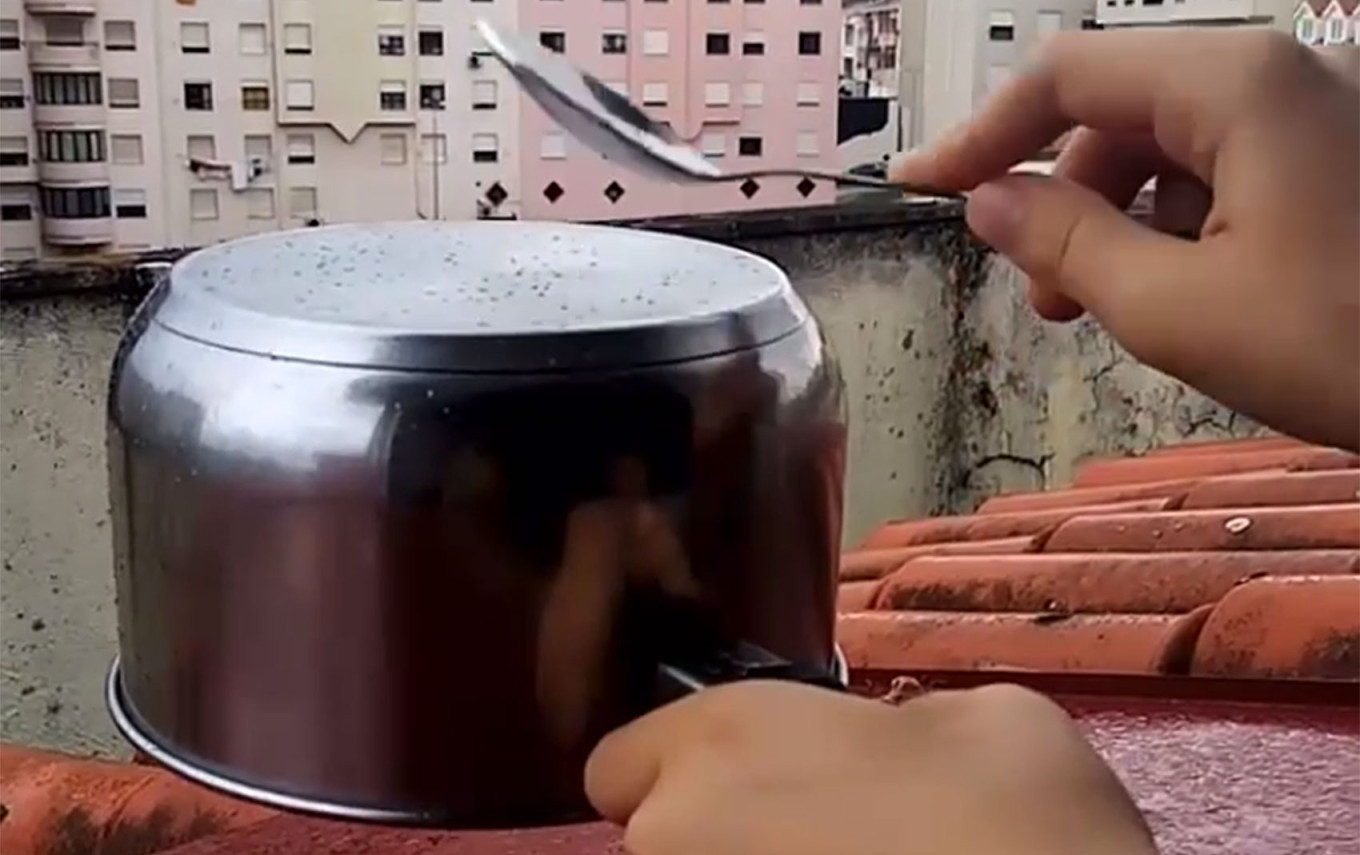
In April, Yulia Demensienko, who had joined Put Domoi several months prior, was detained while laying flowers at the Eternal Flame war memorial in St. Petersburg.
“As soon as I arrived at the monument, an officer from the Center for Combating Extremism appeared and asked for my documents,” Demensienko told The Moscow Times.
“They called the police and took me to the police station. On the way there, we were stopped by other officers who started asking their colleagues why they had arrested someone ‘political’,” she said.
“They started calling around and asking if I had any mobilized relatives,” she continued. “As soon as they realized that I didn’t, and that I was previously arrested at a protest in 2021, they took me to the station, charged me with ‘discrediting the Russian army’ and took away my phone.”
Demensienko said she had joined the movement out of solidarity.
“I think it’s vital to support these women. I wanted to show that their tragedy and their pain matter to others too,” Demensienko said. “In the end, they were left to live and raise their children alone. Bringing them up is not only a female duty, but also very much a male one as well. It feels like our society doesn’t get that families need fathers almost as much as mothers.”
A Message from The Moscow Times:
Dear readers,
We are facing unprecedented challenges. Russia's Prosecutor General's Office has designated The Moscow Times as an "undesirable" organization, criminalizing our work and putting our staff at risk of prosecution. This follows our earlier unjust labeling as a "foreign agent."
These actions are direct attempts to silence independent journalism in Russia. The authorities claim our work "discredits the decisions of the Russian leadership." We see things differently: we strive to provide accurate, unbiased reporting on Russia.
We, the journalists of The Moscow Times, refuse to be silenced. But to continue our work, we need your help.
Your support, no matter how small, makes a world of difference. If you can, please support us monthly starting from just $2. It's quick to set up, and every contribution makes a significant impact.
By supporting The Moscow Times, you're defending open, independent journalism in the face of repression. Thank you for standing with us.
Remind me later.


